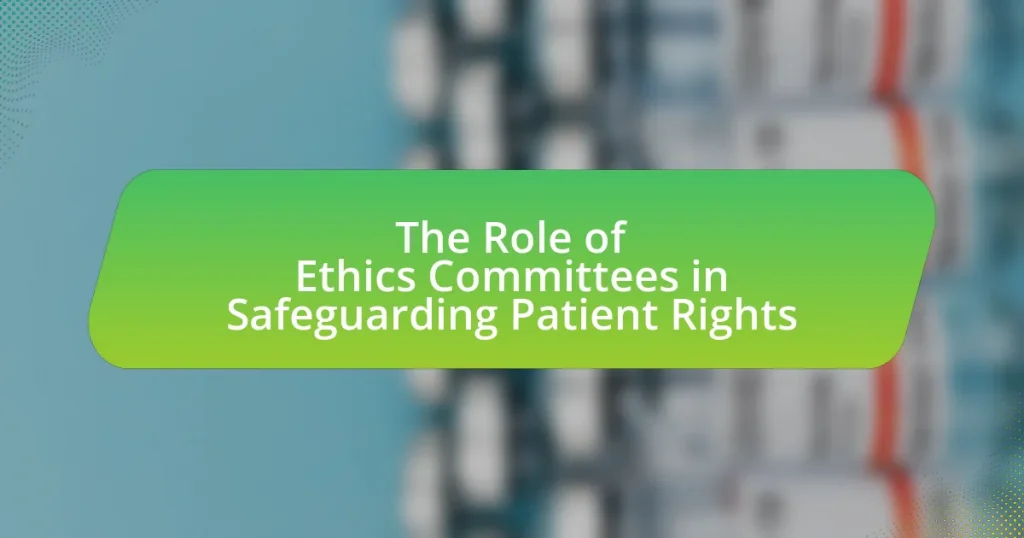Ethics Committees are multidisciplinary groups within healthcare institutions that provide essential guidance on ethical issues related to patient care, ensuring that patient rights are respected, particularly in complex medical situations. This article outlines the functions, roles, and structures of Ethics Committees, emphasizing their importance in safeguarding patient rights, such as informed consent and privacy. It also discusses the processes these committees follow to address ethical dilemmas, the challenges they face, and the strategies they employ to enhance their effectiveness. Furthermore, the article highlights the impact of Ethics Committees on healthcare policy and practice, as well as their role in educating healthcare professionals and advocating for patient rights at a systemic level.

What are Ethics Committees and their Purpose in Healthcare?
Ethics Committees are multidisciplinary groups within healthcare institutions that provide guidance on ethical issues related to patient care. Their primary purpose is to ensure that patient rights are respected and upheld, particularly in complex medical situations involving moral dilemmas, such as end-of-life decisions or informed consent. These committees review cases, offer recommendations, and facilitate discussions among healthcare providers, patients, and families to navigate ethical challenges effectively. Research indicates that the involvement of Ethics Committees can lead to improved decision-making processes and enhanced communication, ultimately safeguarding patient rights and promoting ethical standards in healthcare practices.
How do Ethics Committees function within healthcare institutions?
Ethics Committees in healthcare institutions function as advisory bodies that provide guidance on ethical issues related to patient care and institutional policies. These committees typically consist of a diverse group of members, including healthcare professionals, ethicists, legal experts, and community representatives, ensuring a broad perspective on ethical dilemmas. They review complex cases, facilitate discussions among stakeholders, and help develop policies that align with ethical standards and legal requirements.
For instance, a study published in the Journal of Medical Ethics highlights that Ethics Committees play a crucial role in resolving conflicts between patient autonomy and medical recommendations, thereby safeguarding patient rights. Their recommendations are based on established ethical principles such as beneficence, non-maleficence, autonomy, and justice, which guide decision-making processes in healthcare settings.
What roles do members of Ethics Committees play?
Members of Ethics Committees play crucial roles in evaluating ethical issues related to patient care and institutional policies. They provide guidance on complex medical decisions, ensuring that patient rights and welfare are prioritized. Additionally, they facilitate discussions among healthcare providers, patients, and families to reach consensus on ethical dilemmas. Their expertise helps in developing and reviewing institutional policies to align with ethical standards and legal requirements, thereby safeguarding patient rights.
How are Ethics Committees structured and organized?
Ethics Committees are typically structured with a diverse membership that includes healthcare professionals, ethicists, legal experts, and community representatives. This composition ensures a range of perspectives when addressing ethical issues in patient care. The organization of these committees often involves regular meetings to discuss cases, develop policies, and provide guidance on ethical dilemmas, with a focus on safeguarding patient rights. For instance, the American Medical Association outlines that such committees should include individuals with expertise in ethics, law, and clinical practice to effectively evaluate complex situations.
Why are Ethics Committees essential for patient rights?
Ethics Committees are essential for patient rights because they provide a structured framework for addressing ethical dilemmas in healthcare. These committees ensure that patient autonomy, informed consent, and equitable treatment are upheld, which are fundamental principles of medical ethics. For instance, according to the American Medical Association, Ethics Committees facilitate discussions that help resolve conflicts between patient wishes and medical recommendations, thereby protecting patients’ rights to make informed decisions about their care. Additionally, they serve as a resource for healthcare providers, guiding them in ethical decision-making processes that align with legal and moral standards.
What specific patient rights do Ethics Committees help safeguard?
Ethics Committees help safeguard specific patient rights such as the right to informed consent, the right to privacy and confidentiality, and the right to receive appropriate care. These committees ensure that patients are fully informed about their treatment options and the associated risks, thereby upholding the principle of informed consent. Additionally, they protect patient privacy by establishing guidelines that prevent unauthorized access to personal health information. Furthermore, Ethics Committees advocate for the provision of appropriate care, ensuring that patients receive treatments that align with ethical standards and their individual needs.
How do Ethics Committees address ethical dilemmas in patient care?
Ethics Committees address ethical dilemmas in patient care by providing a structured framework for deliberation and decision-making. These committees consist of multidisciplinary members, including healthcare professionals, ethicists, and community representatives, who collaboratively evaluate complex cases. They analyze the ethical principles involved, such as autonomy, beneficence, non-maleficence, and justice, to guide their recommendations. For instance, a study published in the Journal of Medical Ethics highlights that Ethics Committees often facilitate discussions among stakeholders, ensuring that diverse perspectives are considered, which enhances the quality of ethical decision-making in clinical settings.

What processes do Ethics Committees follow to make decisions?
Ethics Committees follow a structured decision-making process that typically includes reviewing cases, gathering relevant information, consulting with stakeholders, and deliberating on ethical principles. Initially, the committee assesses the ethical dilemma presented, often involving patient rights, informed consent, and potential conflicts of interest. They then collect data from medical records, expert opinions, and legal guidelines to inform their understanding of the situation.
Subsequently, the committee engages in discussions that consider ethical frameworks such as autonomy, beneficence, non-maleficence, and justice. This deliberation often involves input from healthcare professionals, patients, and family members to ensure diverse perspectives are considered. Finally, the committee reaches a consensus or majority decision, which is documented and communicated to relevant parties, ensuring transparency and accountability in the decision-making process. This systematic approach is essential for upholding ethical standards and protecting patient rights in healthcare settings.
How do Ethics Committees evaluate ethical issues related to patient care?
Ethics Committees evaluate ethical issues related to patient care by systematically reviewing cases that present moral dilemmas, ensuring that patient rights and welfare are prioritized. These committees typically consist of multidisciplinary members, including healthcare professionals, ethicists, and legal experts, who analyze the ethical principles involved, such as autonomy, beneficence, non-maleficence, and justice. They engage in discussions that consider the specific circumstances of each case, the values of the patient, and the implications of potential decisions. This process is often guided by established ethical frameworks and institutional policies, which help ensure that evaluations are consistent and grounded in recognized ethical standards.
What criteria do Ethics Committees use to assess ethical dilemmas?
Ethics Committees assess ethical dilemmas using criteria such as respect for autonomy, beneficence, non-maleficence, and justice. These principles guide the evaluation of patient rights and welfare in healthcare settings. Respect for autonomy emphasizes the importance of informed consent and the patient’s right to make decisions about their own care. Beneficence focuses on actions that promote the well-being of patients, while non-maleficence highlights the obligation to avoid harm. Justice pertains to fairness in the distribution of healthcare resources and treatment. These criteria are foundational in ensuring that ethical considerations are systematically addressed, thereby safeguarding patient rights.
How do Ethics Committees involve patients and families in decision-making?
Ethics Committees involve patients and families in decision-making by actively soliciting their input and perspectives during ethical consultations. These committees often hold meetings where patients and family members can express their values, preferences, and concerns regarding medical decisions. For instance, the American Medical Association emphasizes the importance of including patients and families in discussions about care options, ensuring that their voices are heard and considered in the decision-making process. This involvement not only respects patient autonomy but also enhances the quality of care by aligning medical decisions with the patients’ and families’ values.
What challenges do Ethics Committees face in safeguarding patient rights?
Ethics Committees face several challenges in safeguarding patient rights, including balancing individual autonomy with institutional policies, navigating complex ethical dilemmas, and addressing diverse cultural perspectives. These committees often struggle to ensure that patient preferences are respected while also adhering to legal and ethical standards set by healthcare institutions. Additionally, the presence of conflicting interests among stakeholders, such as healthcare providers, patients, and family members, complicates decision-making processes. Research indicates that a lack of resources and training can further hinder the effectiveness of Ethics Committees in fulfilling their roles, as highlighted in studies examining the operational challenges faced by these committees in various healthcare settings.
How do conflicting values impact the decisions of Ethics Committees?
Conflicting values significantly impact the decisions of Ethics Committees by creating challenges in reaching consensus on ethical dilemmas. Ethics Committees often consist of diverse members with varying moral beliefs, cultural backgrounds, and professional experiences, which can lead to disagreements on issues such as patient autonomy, beneficence, and justice. For instance, a study published in the Journal of Medical Ethics highlighted that differing views on end-of-life care can result in prolonged deliberations and affect the timeliness of decisions, ultimately influencing patient outcomes. These conflicting values necessitate structured deliberation processes to navigate ethical complexities and ensure that decisions align with both institutional policies and the best interests of patients.
What strategies can Ethics Committees use to overcome these challenges?
Ethics Committees can implement several strategies to overcome challenges in safeguarding patient rights, including fostering interdisciplinary collaboration, enhancing communication with stakeholders, and providing ongoing education and training. Interdisciplinary collaboration allows diverse perspectives to address ethical dilemmas effectively, ensuring comprehensive evaluations of complex cases. Enhanced communication with stakeholders, including patients and families, promotes transparency and trust, which are essential for ethical decision-making. Ongoing education and training equip committee members with the latest ethical guidelines and legal standards, enabling them to navigate evolving challenges in healthcare ethics. These strategies are supported by research indicating that effective communication and collaboration improve ethical outcomes in clinical settings.

How do Ethics Committees contribute to healthcare policy and practice?
Ethics Committees contribute to healthcare policy and practice by providing guidance on ethical issues, ensuring that patient rights are upheld, and influencing institutional policies. These committees review complex cases, offer recommendations based on ethical principles, and help healthcare providers navigate dilemmas that may arise in patient care. For instance, a study published in the Journal of Medical Ethics found that hospitals with active Ethics Committees reported higher compliance with ethical standards and improved patient satisfaction. This demonstrates that Ethics Committees play a crucial role in shaping healthcare practices and policies that prioritize ethical considerations and patient welfare.
What influence do Ethics Committees have on healthcare regulations?
Ethics Committees significantly influence healthcare regulations by providing guidance on ethical standards and practices that shape policy decisions. These committees assess complex medical cases, ensuring that patient rights and ethical considerations are prioritized in regulatory frameworks. For instance, the American Medical Association emphasizes the role of Ethics Committees in developing policies that address issues like informed consent and end-of-life care, which directly impact healthcare regulations. Their recommendations often lead to the establishment of guidelines that healthcare institutions must follow, thereby reinforcing ethical practices within the healthcare system.
How do Ethics Committees advocate for patient rights at a systemic level?
Ethics Committees advocate for patient rights at a systemic level by establishing guidelines and policies that prioritize ethical considerations in healthcare decision-making. These committees review cases involving complex ethical dilemmas, ensuring that patient autonomy, informed consent, and equitable treatment are upheld. For instance, they may influence hospital policies by recommending practices that align with ethical standards, such as the necessity of advance directives and the importance of cultural competence in patient care. Additionally, Ethics Committees often provide education and training for healthcare professionals, fostering an environment that respects patient rights and promotes ethical practices across the institution. This systemic approach is supported by the American Medical Association’s Code of Medical Ethics, which emphasizes the role of ethics in safeguarding patient interests.
What role do Ethics Committees play in educating healthcare professionals?
Ethics Committees play a crucial role in educating healthcare professionals by providing guidance on ethical standards and decision-making processes. These committees facilitate training sessions, workshops, and discussions that enhance the understanding of ethical principles, such as autonomy, beneficence, and justice, which are essential in patient care. Research indicates that healthcare professionals who engage with Ethics Committees demonstrate improved ethical reasoning and are better equipped to navigate complex clinical situations, thereby safeguarding patient rights.
What best practices can enhance the effectiveness of Ethics Committees?
Best practices that can enhance the effectiveness of Ethics Committees include establishing clear guidelines for decision-making, ensuring diverse representation among committee members, and providing ongoing education and training. Clear guidelines help streamline processes and ensure consistency in ethical evaluations, while diverse representation brings various perspectives that enrich discussions and decisions. Ongoing education keeps committee members informed about current ethical issues and frameworks, which is essential for making informed decisions. Research indicates that committees with these practices are more effective in addressing complex ethical dilemmas, thereby better safeguarding patient rights.
How can Ethics Committees improve their communication with stakeholders?
Ethics Committees can improve their communication with stakeholders by implementing structured engagement strategies that facilitate transparency and collaboration. Regularly scheduled meetings, clear reporting mechanisms, and the use of digital platforms for information sharing can enhance stakeholder involvement. Research indicates that effective communication fosters trust and understanding, which are crucial for ethical decision-making in healthcare settings. For instance, a study published in the Journal of Medical Ethics highlights that committees that actively solicit feedback from stakeholders report higher satisfaction levels and better alignment with patient rights.
What training and resources are essential for Ethics Committee members?
Ethics Committee members require training in ethical principles, regulatory frameworks, and decision-making processes relevant to patient rights. Essential resources include access to guidelines from organizations such as the American Medical Association and the World Health Organization, as well as ongoing education through workshops and seminars focused on bioethics. These training and resources ensure that committee members are equipped to navigate complex ethical dilemmas and uphold patient rights effectively.






